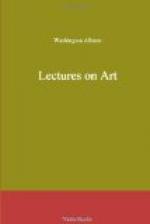If there is a first and a last to any thing, the intermediates can be neither one nor the other; and, if we so name them, we speak falsely. It is no less so with Beauty, which, being at the head, or first in a series, admits no transference of its title. We mean, if speaking strictly; which, however, we freely acknowledge, no one can; but that is owing to the insufficiency of language, which in no dialect could supply a hundredth part of the terms needed to mark every minute shade of difference. Perhaps no subject requiring a wider nomenclature has one so contracted; and the consequence is, that no subject is more obscured by vague expressions. But it is the business of the Artist, if he cannot form to himself the corresponding terms, to be prepared at least to perceive and to note these various shades. We do not say, that an actual acquaintance with all the nice distinctions is an essential requisite, but only that it will not be altogether useless to be aware of their existence; at any rate, it may serve to shield him from the annoyance of false criticism, when censured for wanting beauty where its presence would have been an impertinence.
Before we quit the subject, it may not be amiss to observe, that, in the preceding remarks, our object has been not so much to insist on correct speaking as correct thinking. The poverty of language, as already admitted, has made the former impossible; but, though constrained in this, as in many other cases where a subordinate is put for its principal, to apply the term Beautiful to its various degrees, yet a right apprehension of what Beauty is may certainly prevent its misapplication as to other objects having no relation to it. Nor is this a small matter where the avoiding of confusion is an object desirable; and there is clearly some difference between an approach to precision and utter vagueness.
We have now to consider how far the Correspondence between the outward form and the inward being, which is assumed by the Artist, is supported by fact.
In a fair statement, then, of facts, it cannot be denied that with the mass of men the outward intimation of character is certainly very faint, with many obscure, and with some ambiguous, while with others it has often seemed to express the very reverse of the truth. Perhaps a stronger instance of the latter could hardly occur than that cited in a former discourse in illustration of the physical relation of Beauty; where it was shown that the first and natural impression from a beautiful




